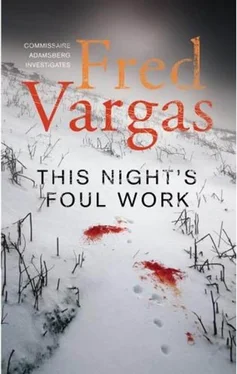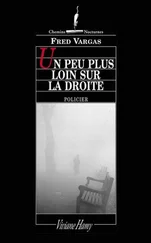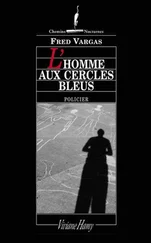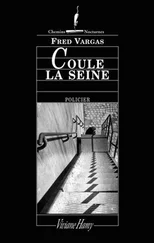Questioning residents in the buildings where both men lived – labyrinths of cold rooms, and non-functioning lavatories in dark stairwells – had produced nothing, nor had visits to all the cafés in the sector from the Porte de la Chapelle to Clignancourt. Both mothers, who were devastated, had claimed that their boys were the best of sons, one showing off a nail-clipper and the other a shawl which they had been given only the month before. Brigadier Lamarre, overcome with timidity, had returned to base very upset.
‘Their old mothers,’ said Adamsberg. ‘If only the real world was like the dreams of old mothers.’
A nostalgic silence hung for a moment over the conference, as if each person present was remembering what the dream of his or her old mother had been, and whether he or she had lived up to it, and if not by what margin the reality had fallen short.
Retancourt had come no nearer than anyone else to fulfilling the dreams of her old mother, who had hoped her daughter would be a blonde air hostess, calming and charming airline passengers; a hope that her daughter’s height of one metre eighty and weight of a hundred and twenty kilos had ruled out after puberty, leaving only the blonde hair – and an ability to calm people which was indeed out of the ordinary. Retancourt had made a small inroad, two days earlier, into the obstructions that seemed to be blocking this inquiry.
After a week of getting nowhere, Adamsberg had taken Retancourt off the almost finished case of a family murder in an elegant dwelling in Reims and had sent her to Clignancourt, rather as one might try a magic potion as a last resort, without being sure what to expect from it. He had sent Lieutenant Noël with her, a hefty, broad-shouldered and leather-jacketed character with protruding ears, a man with whom he did not get on well. But Noël was, he thought, suitable for protecting Retancourt on this difficult assignment. In the end, and he really ought to have expected it, it was Retancourt who had come to Noël’s rescue, after their inquiries in a café had degenerated into a brawl that spilled out into the street. Retancourt’s massive intervention had calmed down the group of angry men and she’d pulled Noël free from the three individuals who seemed bent on making him eat his birth certificate. Her talent for resolving matters had impressed the bistro owner, who was getting tired of the fights that often broke out in his establishment. Forgetting the rule of silence in the Flea Market district, and possibly moved by an admiration of the same order as that felt by Estalère, he had come running after Retancourt to get something off his chest.
Before making her report, Retancourt untied and redid her short ponytail, the only trace, Adamsberg thought, of her childhood shyness.
‘According to Emilio – that’s the café owner – it’s true that Diala and La Paille weren’t normally seen together. Although they operated only about five hundred metres apart, they weren’t working the same zones in the market. The geographical divisions of the quartier mean that various tribes who shouldn’t mix are kept apart, or there might be trouble and reprisals. Emilio says that if Diala and La Paille got involved in something together, it wouldn’t have been on their own initiative, it must have been through some other person, a stranger to the ways of the market.’
‘An outsider,’ said Lamarre, for once abandoning his usual reserved approach.
Which reminded Adamsberg that the timid Lamarre came from Granville – from Lower Normandy, therefore.
‘Emilio thinks that this stranger might have chosen them because of their brute strength: for some raid, or perhaps to intimidate or beat someone up. But at any rate, whatever it was turned out well, because two days before the murders they turned up for a drink in his bistro. It was the first time he’d ever seen them together. It was nearly two in the morning, and Emilio wanted to shut up shop. But he didn’t dare say no to them, because the pair of them were well launched – they were big lads and they’d already had way too much to drink.’
‘We didn’t find any money on them, or in their lodgings.’
‘Maybe the murderer took it back from them.’
‘Did Emilio hear what they said?’
‘He wasn’t particularly listening, he was just going to and fro, clearing up. But these two were alone in the café, they weren’t taking any precautions, and were laughing and shouting at the tops of their voices. In the end, he had to tell them to shut up, they were shouting loud enough to waken the dead, never mind his mother upstairs. That just made them fall about laughing all the more, they nearly pissed themselves. Emilio gathered that they’d had some work that was very well paid, and had only taken an evening. No mention of any fight or anything. It was on the other side of Paris, in Montrouge, and their boss had just left them there once the job was done. Montrouge, Emilio’s sure about that. He fixed them some sandwiches and they finally pushed off at about three o’clock in the morning.’
‘Perhaps they had to deliver or collect some heavy consignment,’ suggested Justin.
‘It doesn’t sound like drugs to me,’ Adamsberg said, obstinately.
The previous night, in Normandy, he had refused to answer the n th call from Mortier. He could have told Mortier that one of the mothers swore blind that her son, Diala, didn’t touch drugs. But for the head of the Drug Squad, the fact that someone had a black mother at all was enough to create a presumption of guilt. Adamsberg had managed to obtain from his divisionnaire a delay before he had to hand over the file, and the deadline was in two days.
‘Retancourt,’ said the commissaire , ‘did Emilio notice anything about their hands, or their clothes? I’m thinking mud or earth.’
‘Don’t know.’
‘Call him.’
Danglard announced a break. Estalère jumped up. The brigadier had a passion for things that interested nobody else, such as memorising personal preferences. He brought out twenty-eight plastic cups on three trays, putting in front of each officer his or her favourite drink – coffee, chocolate, tea, large, medium or small, with or without milk and sugar – without making a single mistake. He knew that Retancourt liked her coffee black and without sugar, but that she liked to have a spoon to stir it with. He would not have forgotten the spoon for the world. Nobody knew why this chore gave such innocent pleasure to Estalère, who had something of the medieval page-boy about him.
Retancourt came back, holding her phone, and Estalère pushed towards her a cup of sugarless coffee and a spoon. She smiled her thanks, and the young man sat down happily at her side. Of them all, Estalère still did not seem to have fully grasped that he was working on serious crimes, but went about in the team like a happy teenager, glad to be one of the gang. He would have slept there if he could.
‘Yes, they had dirty hands, stained with earth,’ Retancourt announced. ‘Shoes as well. After they had gone, Emilio had to sweep up dried mud and bits of gravel they had left under their table.’
‘What’s the idea?’ asked Mordent, poking his head up from his stooping shoulders, like a great grey heron sitting at the table. ‘Had they been digging up a garden or something?’
‘Digging in the earth, at any rate.’
‘Should we start looking in all the parks and waste ground in Montrouge?’
‘But what would they have been doing in a park? With something heavy?’
‘Go and take a look anyway,’ said Adamsberg, giving up and suddenly losing interest in the conference.
‘Perhaps they had a trunk to move somewhere?’ suggested Mercadet.
Читать дальше












